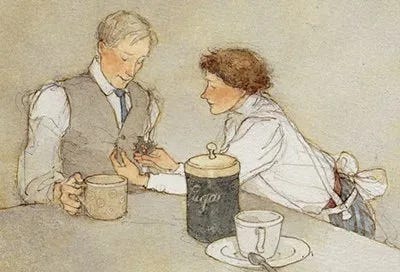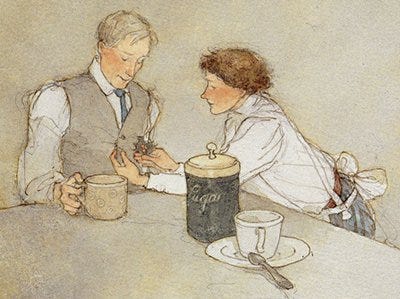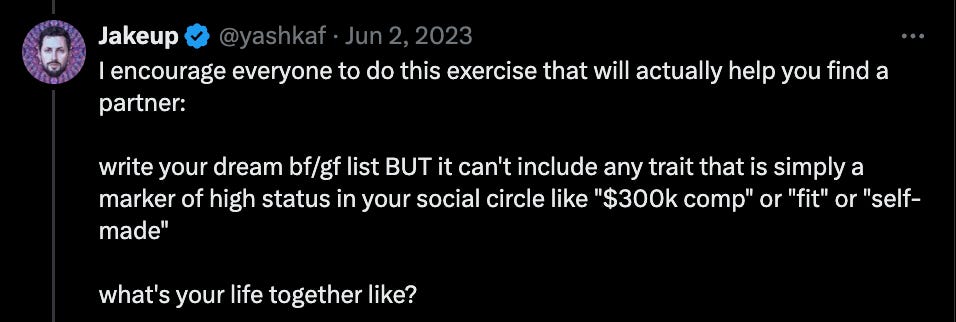We don't even know what our desire is. We ask other people to tell us our desires. We would like our desires to come from our deepest selves, our personal depths - but if it did, it would not be desire. Desire is always for something we feel we lack.
René Girard
Modern Love
I saw a post on Instagram a while ago, I can’t find it now, but I’m sure you’ve seen similar and will know what I’m talking about. It was a girl making a post with her boyfriend, a black and white photo of them embracing at the end of a dark hallway. They might have been newlyweds, and the caption was this long screed that was remarkable in that it did not particularly seem to be about their relationship at all.
It was more directed towards her peers. She spent about half of it vaguely calling out people who’d been disloyal to her, who’d doubted her, her haters; and the other half talking about how wonderful her husband is and how happy they are together and the amazing life they were going to have together. But even that wasn’t really about him. Down to the staging of the photo (you couldn’t see his face, and the pose was unnatural), he didn’t really factor in - reduced to playing a role, a mere accessory for use in her broader conflict with her social world.
This is of course standard on social media. The point tends to be less about connecting with others over something, and more about demonstrating something about yourself to them: shoring up some perceived weakness or flaw, dispelling some old criticism, proving your worth.
I think everyone does it at least a little bit - we’re wired to. It’s about social belonging; being enough be accepted by your tribe and defending your position among them. But it’s becoming an increasingly difficult problem to solve, and it’s swallowing the rest of our lives.
Take dating:
I think people would be surprised how much of what they think they desire romantically is actually at bottom about appearances and social prestige - the being vs. the having, metaphysical vs. physical in Girard’s terms.
There’s an amount of it that makes sense. We have egos for a reason, and it makes sense that our desires would align with and satisfy them. But our egos can work against us too, making us feel we need things that don’t actually serve us. And as the problem of Self and belonging gets more complicated, our egos are growing with it.
I remember in college after people would hook up after a night drinking, they’d often be absolutely mortified to run into each other later on and would take great pains to avoid it. Maybe part of it is just emotional immaturity, discomfort with intimacy and not knowing how to navigate it. But I think it was much more about social concerns - fear about about associating themselves with another in such a significant way, what they might reveal and how it might diminish them in the eyes of their broader social sphere.
I think it’s the major reason why people today are having trouble finding a partner: as our ego commitments grow, it gets harder and harder to find someone who can meet them. And it’s not serving us - most of what is good in love comes from transcending yourself, learning to care more about another. But we’re increasingly precluded from ever getting there.
The most insidious thing I think is that it warps the way we fundamentally see the world, and in ways we don’t tend to notice. For instance I don’t think our judgements of attractiveness or the weights we give them are entirely our own. There’s an aspect of it that we learn, this set of largely social concerns and associations that we absorb and layer over reality to the point where they crowd out and almost replace what’s underneath. I’m not saying beauty is entirely a social construct or that anyone should date someone aren’t attracted to, but can you remember how you saw the world as a child?
I think this is exactly what Girard is getting at when he says we learn our desires from others. Our egos are our way of holding on to everything we believe we need, and much of that is socially defined. And the desire that comes from it is inherently unfulfilling - it’s about protecting ourselves, shoring up vulnerabilities and the things we feel we lack, rather than about anything positive we really want. The more we come to orient to the world in terms of it, the more miserable we become.
Everything good is out beyond the Self, but the way we’ve set up our social world seems almost designed to keep people stuck in it.
Is there another way?





